Roger Ebert's Disliked Films: 10 Classics The Famous Critic Hates
If you enjoy reading about films, chances are you've heard of Roger Ebert. Born in Illinois, the journalist worked for the Chicago Sun-Times from 1967 to 2013 and gained worldwide recognition as a film critic from the early days of his writing career. In 1975, he became the first film critic to win the Pulitzer Prize. We've compiled a list of 10 films that are generally well-loved and some have even become classics, but Ebert didn't quite appreciate them.
Batman (1989)
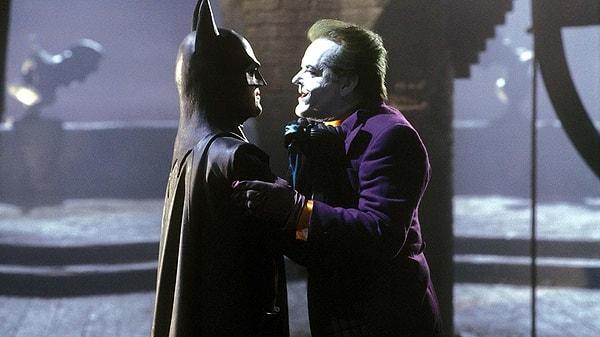
IMDb: 7.5
Roger's Rating: 2/4
Released in 1989, Batman is a large-scale Hollywood adaptation of a superhero. The film tells the story of Bruce Wayne donning bats to fight crime in the already decayed version of Gotham City. A sociopath known as the Joker takes over the town with his use of dangerous substances and escalating violence. Batman must take care of business while also falling in love with a journalist named Vicky Vale, showing his emotional side. The film was a box office hit in its year of release, and everyone praised Burton for maintaining his identity as a comic book producer while bringing the comic to the screen. Michael Keaton's portrayal of Batman and Jack Nicholson's groundbreaking performance as the Joker also played significant roles in the film's success. However, it didn't impress the critic Roger Ebert: 'But did I care about the relationship between these two cartoons? Did either of them have the depth of a comic book character? Not really. And beneath the film's violence was an unpleasant anger. It's an ugly, mean-spirited film about ugly, mean-spirited people and doesn't produce the liberating joy of Superman or Indiana Jones films. It may be rated PG-13, but it's not for kids.' Fortunately, he was right about this.
Beetlejuice (1988)
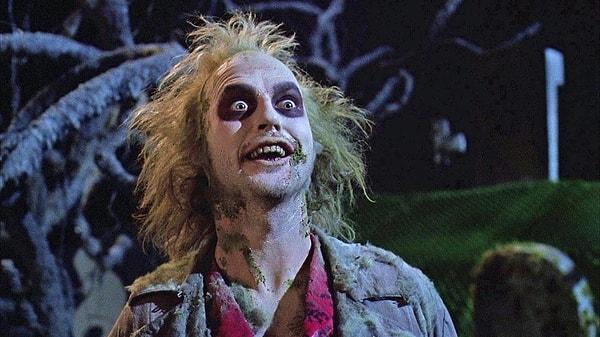
IMDb: 7.5
Roger's Rating: 2/4
Tim Burton's Beetlejuice tells the strange story of Adam and Barbara, who live outside a small town in America. When they die in an accident, their ghosts are trapped in their beautiful home, and they are determined to scare away the obnoxious city dwellers who buy their house. In their quest, they seek help from the 'bio-exorcist' Beetlejuice. The film was a huge success with critics and audiences alike, winning an Academy Award for Best Makeup. However, Roger Ebert wasn't too impressed with Burton's and Michael Keaton's performances: 'One of the problems is Keaton as Beetlejuice. Hidden behind makeup, he becomes almost unrecognizable and bounces around as a joker and a revenger to play Beetlejuice. However, his scenes don't seem to fit with the rest of the action, and their appearances are mostly a nuisance. Also, wasting time trying to fool Jeffrey Jones and Catherine O'Hara as ghosts and winning the sympathy of their daughter is a disappointment.'
Saw (2004)
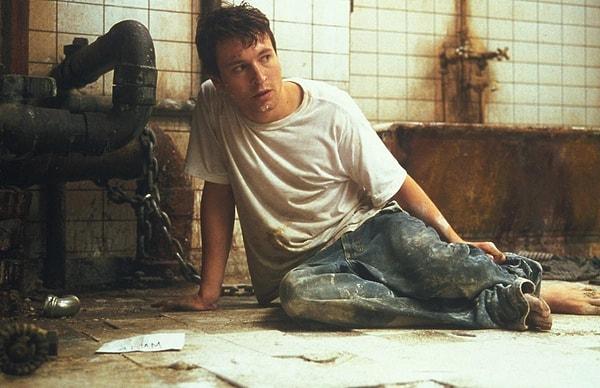
IMDb: 7.6
Roger's Rating: 2/4
James Wan's horror thriller Saw tells the story of a very sick individual who puts people into complex traps representing their deaths. However, Jigsaw doesn't actually kill anyone; he just wants people to learn their lessons. This is the case with Dr. Gordon and Adam, two strangers who find themselves locked in a dirty bathroom, chained to pipes, with a dead body between them. After understanding what Jigsaw wants from them, they do everything to stay alive. In his review, 'A film that conceals a killer's identity is, in general, of a lower order than one that is truly interested in him as a character. Knowing someone, meeting him, is far more satisfying than introducing him. This forced scene of him surviving for so long because that mandatory scene was great. Because that mandatory scene survived for so long, it's not as satisfying. At the critical moment, the killer is crushed under a ton of canned soup, and we never find out who he is, what do you think?' he expresses.
Blue Velvet (1986)
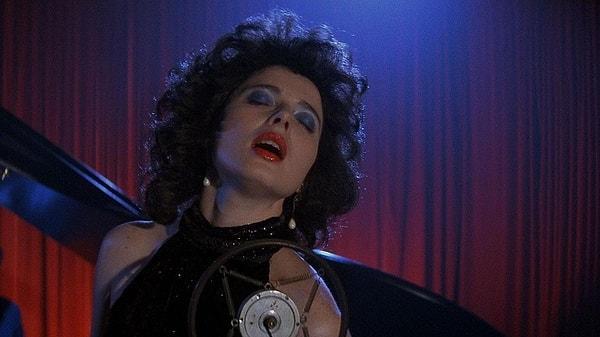
IMDb: 7.9
Roger's Rating: 1/4
In David Lynch's Blue Velvet, Jeffrey Beaumont falls in love with the wrong girl. A young and innocent college student is forced to return home when his father suffers a heart attack, and after reporting a severed ear to the police, he enters a dark and dirty subset of poverty. The only light at the end of the tunnel seems to be a nightclub singer named Dorothy Vallens, who is rapidly falling in love with but is actually a strange criminal tied to Frank Booth. The film strangely earned Lynch an Oscar nomination for Best Director. However, Roger Ebert went through the film's uniqueness and more revision. He was always vocal about this: 'The relationship between Rossellini and MacLachlan attracted and convinced me, but I was annoyed because the director kept putting himself in my search with the material. After five or 10 minutes of overwhelming screen reality, I didn't need the director to keep showing me he was entertaining by walking around with a hat and a cane, whistling.'
Rope (1948)
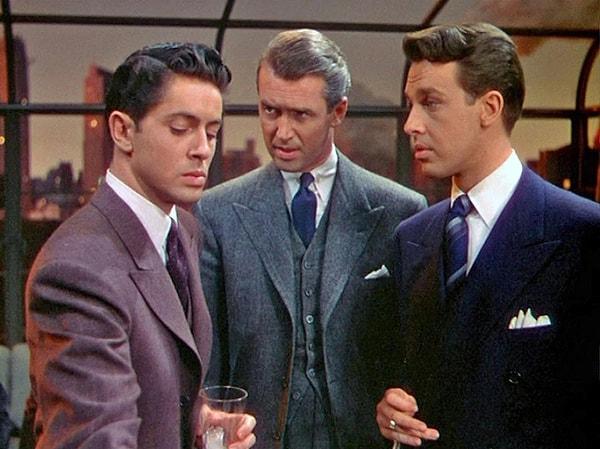
IMDb: 7.9
Roger's Rating: 2/4
Alfred Hitchcock's thriller film Rope takes us to an intimate apartment in Manhattan. Brandon and Phillip murder their former classmate to prove their superiority and aim to commit the perfect crime, hiding the body in a large chest in the living room. The interesting part of the evening is when the couple's former house managers host a dinner party, and the deceased's family also attends. The smart house manager Rupert begins to suspect that Phillip and Brandon might have something to hide. The film unfolds in real-time and consists of long, uninterrupted scenes. This, in 1948, was significant. Interestingly, Roger Ebert didn't quite like the suspense master's film. His view, of course, was about the 'trap' of long shots: 'In a regular film, close-ups show more intensity, long shots show a more objective perspective. Camera movement determines mood. Close-ups emphasize dramatic moments. Cuts, or 'reaction shots,' clearly show who reacted to what and when. Hitchcock tried to choreograph his 10-minute scenes to have the camera where drama required it to be, but sometimes it would be in the wrong place. And that chest stays in the foreground for so long that we wonder why it's not directly focused on.'
Edward Scissorhands (1990)

IMDb: 7.9
Roger's Rating: 2/4
The film tells the story of the Boggs family welcoming Edward into their family. Edward is a young man living in a Gothic and terrifying mansion overlooking the town, with scissors for hands. Peg is convinced he can get along better with a family, and when she meets him, the young Boggs falls in love with Kim, the daughter. However, prejudices and Edward's strange appearance will be more important in this Gothic romance story. Nominated for an Academy Award for Best Makeup, Edward Scissorhands solidified Tim Burton as a storyteller known for his ability to portray the weird as beautiful, romantic, and captivating. It stars Johnny Depp and Winona Ryder and brought them into the limelight, with many claiming it to be Burton's best film to date. Apparently, due to Burton's characterization skills, Roger didn't like the film. 'A Burton film, like Pee-wee, the devil Beetlejuice, Batman, Joker, or Edward Scissorhands, exists in personality vacuums; peculiarities that have no connection to the real world. Saying something about a director's work is more satisfying than meeting someone with the best-rounded and socialized hero in any of his films as Pee-wee Herman.'
Die Hard (1988)

IMDb: 8.2
Roger's Rating: 2/4
In Die Hard, New York City Detective John McClane meets his wife in Los Angeles. Their relationship isn't exactly solid, but they seem to be working on it. However, this holiday rendezvous is cut short when McClane and his wife Holly attend a Christmas party at a skyscraper that terrorists take over. Of course, the fearless detective decides to fight every criminal to expose Hans Gruber's master plan and confront a tough NYC cop. While only nominated for technical categories (Best Sound Effects, Best Film Editing, Best Visual Effects, and Best Sound), the film received worldwide acclaim and propelled Bruce Willis into an action star. Director John McTiernan had tried to gain fame with Predator, but Die Hard was the film that achieved it. Today, it's considered one of the best action films ever made. Ebert didn't warm up to the film and used words like 'confusion' and 'deliberately useless' in his reviews: 'Without Chief Inspector and everything he represents, it would be a more acceptable thriller. Without him, it relies on confusion, and that's a chance, because the film includes outstanding special effects, impressive dubbing work, and particularly good performances from Rickman as a terrorist. Thriller producers, an offer: you can't go wrong with all the characters in your film, at least as intelligent as most of your audience.'
A Clockwork Orange (1971)
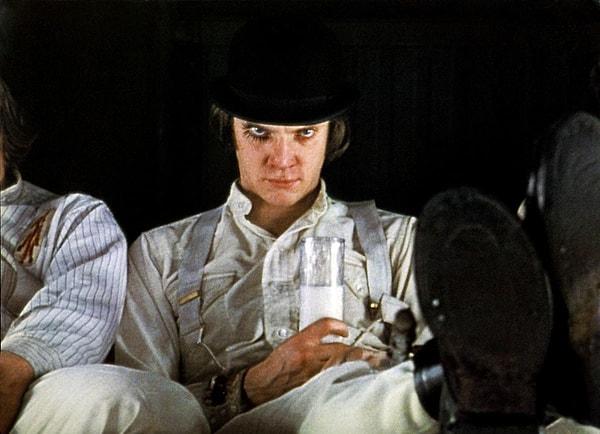
IMDb: 8.3
Roger's Rating: 2/4
Stanley Kubrick's film A Clockwork Orange takes viewers to a futuristic version of Britain where laws seem more like suggestions. Alex and his friends form a gang called the 'droogs,' use a peculiar dialect, and cause chaos everywhere. However, Alex gets caught and is sentenced to prison. That's when his real journey begins as he undergoes strange experiments aimed at changing his behavior. Ebert criticized A Clockwork Orange for its extreme violence and claimed that Kubrick glorified the character of Alex and everything he represented in the film. According to Ebert, Kubrick suggested that living in a criminal society normalizes citizens' criminality. He also found the film boring and talkative but praised its cinematography.
Gladiator (2000)
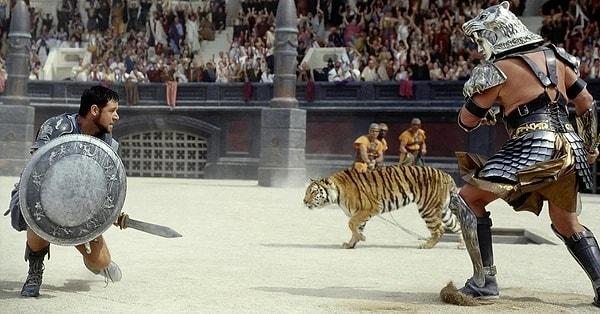
IMDb: 8.5
Roger's Rating: -2/4
Ridley Scott's historical drama Gladiator tells the story of Roman general Maximus Decimus Meridius. The story takes a dark turn when his leader and mentor Marcus Aurelius dies, and a terrible experience ensues when his son takes the throne. Aurelius' treacherous son Commodus kills his own father and seizes power. When Maximus doesn't comply with the rebellion, Commodus kills his family and sends him into exile. Maximus swears revenge and eventually comes back as a gladiator who will stop at nothing but to kill the new emperor. The film received great praise from critics and won the Oscar for Best Picture in 2001. However, Ebert didn't like the film much. In his review, he criticized the film from an artistic perspective, mentioning that it was overshadowed by its gloomy cinematography and blurry special effects. In his words, 'Gladiator lacks joy. It uses depression instead of personality, thinking that the more ruthless and gloomy the characters are, the less we'll notice their dullness.'
The Usual Suspects (1995)
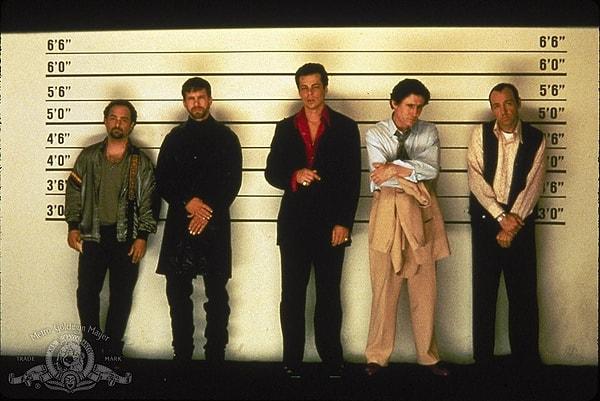
IMDb: 8.5
Roger's Rating: 1.5/4
The Usual Suspects tells the story of U.S. Customs Agent Dave Kujan interrogating one of two survivors of a horrific massacre. The other survivor is lying in a hospital bed, badly burned. 'Verbal' Kint, interrogated by Kujan, narrates events leading up to a fire-related incident involving a handful of victims and sheds light on the events culminating in crime lord Keyser Soze's escape. Kint unravels the mystery behind a failed robbery that began with a chance encounter at a police station, through a flashback narrative. The film is mostly known for having one of the greatest surprise endings of all time. It won two Oscars: Best Original Screenplay (Christopher McQuarrie) and Best Supporting Actor (Kevin Spacey). However, Roger was not a fan. In fact, this is one of those instances where he clearly discussed the film's indifference early on and wasn't keen on revisiting it. He mentioned that the story was confusing and not engaging. His review includes these words: 'When I first saw The Usual Suspects at the Sundance Film Festival, I thought I was losing the thread of the story, perhaps because I had seen too many movies that day. Some members of the audience liked it, so I went to see it again, armed with a notebook and a determination not to miss key critical points. Yet, my comprehension was slipping, and I eventually wrote this: 'As far as I can comprehend, I don't care.''
Keşfet ile ziyaret ettiğin tüm kategorileri tek akışta gör!


Send Comment